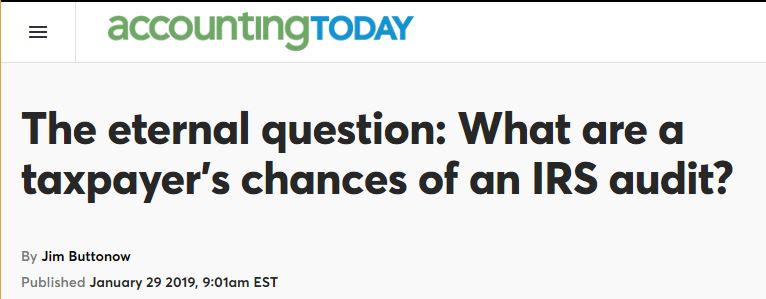My Accounting Today article on the chances of an IRS audit. There are certain types of taxpayers and taxpayer profiles that stand a higher chance. Here is the data.

Tax problems? tax controversy representation and consulting for clients and tax firms
My Accounting Today article on the chances of an IRS audit. There are certain types of taxpayers and taxpayer profiles that stand a higher chance. Here is the data.

Four taxpayer profiles that are prime targets for IRS audits. Here is where some prevention and extra due diligence may go along way if the return ever comes under audit. My AICPA CPA Insider article analyzes the IRS interest in the four taxpayer profiles and the extra due diligence you can perform before filing to prevent an IRS audit problem.
Worker status determinations – that is, whether a worker is an employee or independent contractor – is an issue in every IRS business audit. The costs of getting worker reclassification can be great. There are several IRS amnesty programs that businesses should consider. My AICPA CPA Insider article highlights these programs and alternatives.
Worker status issues – that is, whether a worker is an employee or an independent contractor – can have detrimental tax effects if you get the classification wrong. My AICPA CPA Insider article gives you six myths that are often relied on to claim that a worker is incorrectly classified as an independent contractor.
In all IRS office and field audits, unreported income is a primary issue. The IRS takes great effort and uses several techniques to find unreported income. Be prepared for an IRS and read my AICPA CPA Insider article to analyze whether the IRS will question whether your client has reported all of their income. Failing to do so can result in a very long audit with a very suspicious auditor. Be prepared with a proactive answer by simulating these 5 actions the IRS will take in an audit to see if there is unreported income.
IRS wants to audit more S corporations and partnerships focusing on these areas:
My CPA Practice Advisor article focuses on IRS compliance efforts to audit more flow-through entities and what you can do to prepare for an IRS inquiry or audit of your S corp or partnership.
My CPA Practice Advisor article on March Madness NCAA tournament betting – and its impact on your tax return. Here are 5 tips on reporting gambling on your tax return.
My AICPA CPA Insider article on best practices for IRS face-to-face audits (office and field audits). In these audits, it is absolutely necessary to prepare ahead of an audit. Here are some steps to take to make sure you are ready for the audit and you get the best outcome.
My H&R Block article about how the IRS is questioning education credits by using Forms 1098-T to match against tax returns in the CP2000 automated underreporter program. The IRS asks for proof that the education expenses have been paid- this sounds more like an audit than an underreporter notice. This is another example of the IRS questioning more returns using automation. Here is what to do.
My article for H&R Block that provides the “real” IRS audit rate. The media states the chance of an IRS audit is 1 in 143 – it is actually much higher because the IRS uses automated “audit” methods, like matching notices and return rejects. The real “audit” rate is actually much higher – and because much of the process is automated, the IRS can maintain high rates of coverage – unlike the published “audit rate” indicates.
Copyright © 2024 · Agency Child Theme on Genesis Framework · WordPress · Log in